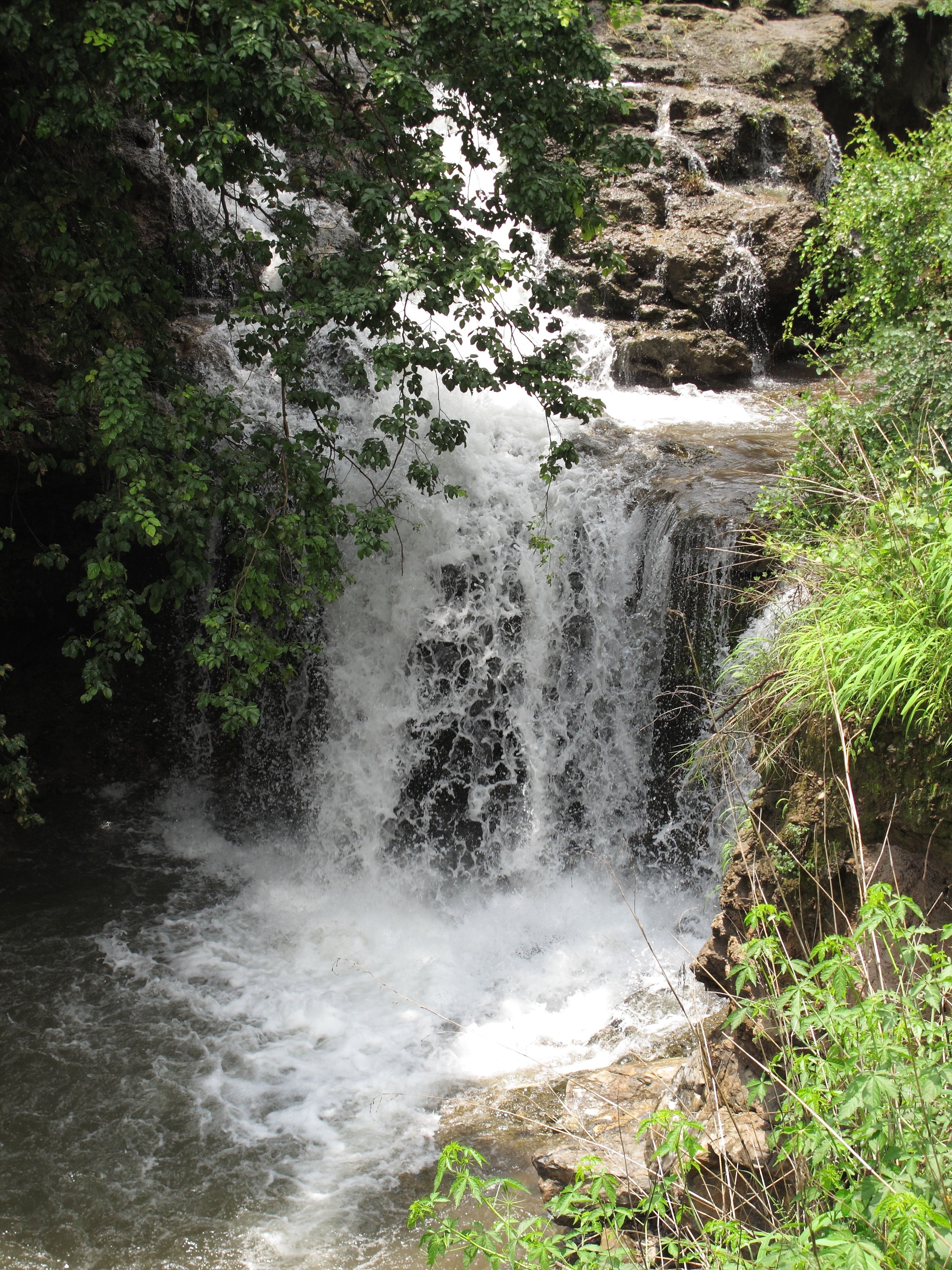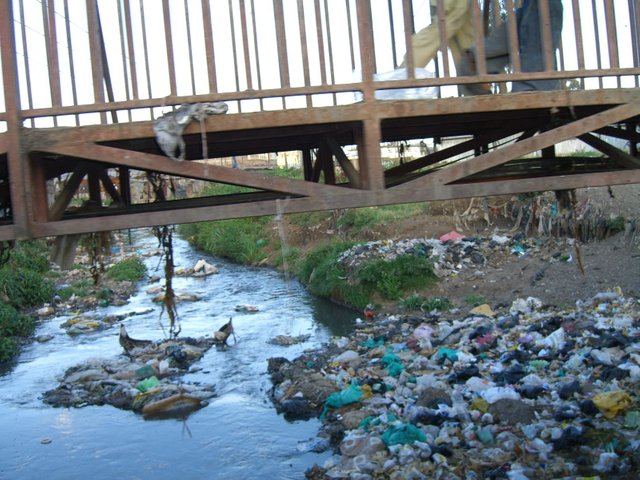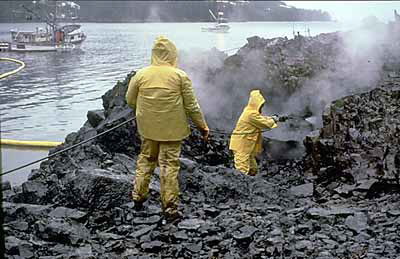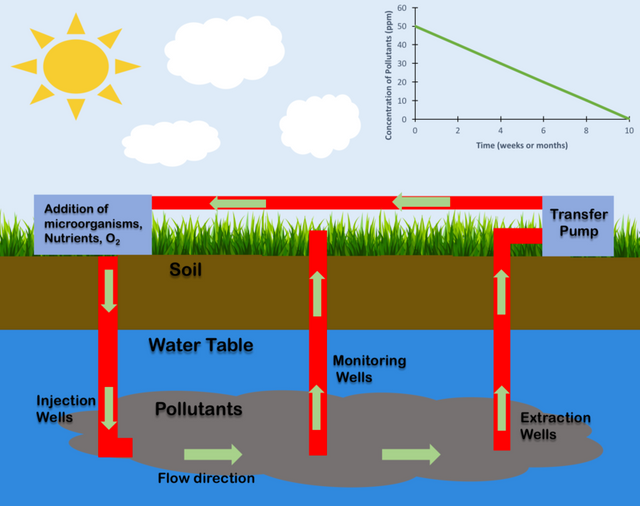Bio-remediation: Our Savior?
Picture this.
You're standing on the edge of a stream. It is gradually approaching dusk. You can see the clear white sands of the streambed down below. It is so clear it takes your breath away. The fishes are preparing for bed. You can hear the crackling, whistling sounds of animals making the night calls for their young ones as they retire for the day. Take a deep breath. The air is so clean you hold your breath for just a second longer, unwilling to pollute the air with your carbon(iv) oxide. But you remember the vegetation needs them to give you back the oxygen you need to survive.

Source- Jhala
You exhale.
It is paradise.
Picture the opposite: The air is dense with smoke. You struggle to draw breath. It is so thick, you can barely see in front of you. The urge to cough creates painful pressure in your chest, but you hold it. To give in to the urge to cough would mean taking in more of the polluted air. Your throat constrict, you sputter and you cough. Huge hacking, violent jerks hit you. Somehow, you make it past the smoke to a better place. The nearby stream.
But a thick filmy substance covers the stream. The surface of the water is still and you can't make out the bottom because all you see is your reflection and the ripple of colors from oil. There are no signs of fishes, none of the ripples to give them away. There are all dead.

Source: khyk54
“ ...those ruining the earth.”
(New World Translation, Revelation 11:18)
Are we ruining the earth? The book of Revelation, the last chapter of the Bible has been criticized for its dire warnings of doom, the war of Armageddon and the total destruction of the world as we know it. For the sake of appropriateness and social inclusion, let’s leave this Bible out of this.
Is our environment coming to ruin? Who is responsible? One look around us and the answer to these questions can be answered in one voice. Our natural environment has undergone more changes in the past decade than the fifty years before it combined. A close study of the drastic changes and the dire state of the environment reveals one startling but unsurprising fact: we are responsible. We did this.
Our environment includes the physical, biological and chemical entities all around us. Our survival and most importantly our future is dependent on the state of our environment. Ecology is a scientific study of the relationship between man and his environment. How the changes in the environment affect him physically and physiologically.
And it does.
Oil spillage, rising atmospheric temperatures, greenhouse effect and the melting of the glacial caps, deforestation, land management, waste disposal, overpopulation, loss of biodiversity, water scarcity, water pollution, air and land pollution, ecosystem and endangered species, and the worst, climate change. Every day we see and live the effect of these changes, some more than others. So their existence is not a question but a foregone reality.
Is there a solution?
One that has particularly interested me is bio-remediation.
What is Bio-remediation?
The word ‘bio-remediation’ is coined from two words. Bio from biological, and remediation from the word ‘redeem.’ Biological means living or naturally occurring, while remediation means to bring to right or correct.
What then is bio-remediation?
It is the use of natural organisms to degrade, neutralize, correct and render toxic substances in our environment harmless. Bio-remediation is a chemical change, an irreversible process that transforms usually harmful substance to harmless or neutral agents. One big advantage of the bio-remediation process is the natural, ‘non-invasive process’ of restoring the environment.

Source: Public Domain
History
The use of bio-remediation as a cleaning agent can be traced as far back as 600BC when the Roman soldiers used the process to neutralize liquid waste. The Roman version of bio-remediation was awkward, cumbersome but no less effective. Humanity waited until the 1960s when George Robinson formally introduced bio-remediation as an effective means of combating environmental pollution. Since then, there has been a greater number in the microbes used, the complexity of the process and an improvement in the results obtained.
Process and technique
Since the efficient but antiquated bio-remediation process of the ancient Romans, bio-remediation and biotechnology has evolved as a branch of science to proffer a saving solution to the problem of environmental pollution and degradation.
Chemistry of the bio-remediation
In bio-remediation, a chemical change occurs that renders the harmful substance harmless. Most commonly, a type of reaction called a redox (reduction-oxidation) reaction that involves two types of chemical agents, one a reductant and the other an oxidant takes place. In a redox reaction, an electron donor or the reducing agents donate an electron to oxidize the electron acceptor or the oxidizing agent.
To speed up the bio-remediation process, specific microbes are introduced into the degraded environment to facilitate the decomposition of the toxic substances to an eco-friendly one. These microbes require either an anaerobic (no oxygen needed) or aerobic condition. (oxygen is required) The degree of clean up done by the microbes is dependent on a lot of conditions ranging from the level of degradation, the type of contaminants involved and whether optimal requirements for microbial activity are met.
Types of Bio-remediation.
Not all bio-remediation technique is best suited for a particular site. The technique to be used is dependent on a number of factors.
Classification based on the type of microbe used
Chemosynthesis is the process by which certain organisms break down organic substances to create energy. This process is also heavily involved in bio-remediation. Bacteria does most of the job in the cleaning up process but when any other organism is used, it determines the name of the bio-remediation process.
- Mycoremediation- Fungi is used.
- Phytoremediation- Plant is used.
- Microbial bio-remediation- Different microorganisms are employed to digest harmful substances.
Classification based on oxygen requirement
- Aerobic bio-remediation
- Anaerobic bio-remediation
Classification based on location.
When the level of environmental degradation is calculated to be potentially harmful to the surroundings or if the level of degradation can only be combated by excavating the polluted site, it determines the type of bio-remediation process to be used.
- In situ bio-remediation- The bio-remediation activity is conducted on the polluted site. This is also done when the polluted site is judged to be harmless to the surroundings.
- Ex situ bio-remediation- The bio-remediation is conducted in a farther location from the origin of pollution. When the polluted site is adjudged to be potentially harmful to the surroundings, the site is excavated and transplanted to a remote location where bio-remediation would be carried out.

Source: Hoodlind
There are three processes of in situ bio-remediation
Bio-stimulation- In this process, the microorganisms are ‘helped’ to degrade harmful substances by providing an optimal environment for the process as well as nutrients. Ensure the microorganisms are healthy and release substances to improve the activity of the microbes so the bio-remedial process would be quicker.
Bio-augmentation- In this process biological microorganisms are introduced into a polluted site to aid or augment the remedial process.
Bioventing- In this proces air is introduced into vents dug in the contaminated site.
Conditions that determine the type of bio-remediation to be used.
- Type of microbe to be used.
- Site of degradation
- Type of contaminant
- Oxygen
- Carbon
- Water
- Nutrient
- Temperature
- Optimal pH
When these elements are provided in the right amount, along with the healthy microbes, bio-remediation will occur.
Common pollutants
- Agrochemicals
- chlorinated compounds
- Dyes
- Greenhouse gases
- Heavy metals
- Hydrocarbons
- Nuclear waste
- Plastics
- Sewage
Advantages
- Bio-remediation is environmentally friendly and noninvasive
- It is considerably cheaper and more effective than any other methods to save the environment
- While most effort to fight pollution involves merely shifting the contaminant to another location, bio-remediation renders the harmful pollutants harmless.
Applications of bio-remediation
- Crime scene- Rather than use the common bleach to sterilize a crime scene, bio-remediation can and is being used to degrade the blood and chemicals instead.
- Fight pollution- This is the major reason why bio-remediation was invented in the first place.
Bio-remediation and genetics
In recent times as more advances in biotechnology is achieved, the efficacy of bio-remediation has also improved. The importance of this process to our environment and to curtail the effect of human activities on our ecosystem cannot be overemphasized. Our changing ecosystem, the loss of biodiversity and the pollution of water bodies in some communities have reduced the standard of living and increased the rate of unemployment.
A classic case is the people of Niger Delta in Nigeria where a majority of the populace are fishermen before oil spillage severely altered the environment, resulting in loss of biodiversity.
To drastically improve bio-remediation methods, genetics was merged with bio-remediation. The use of genetically enhanced modified microorganisms (GEM) has gone a long way towards accelerating bio-remediation. These genetically modified organisms come with different metabolic pathways and wholly altered approach to the traditional bio-remediation.
Another novel approach is in the use of genetic engineering to create organisms specifically designed for a particular contaminant. This has a lot of potential as it would be considerably more effective than introducing a slew of microbes to a contaminated site and being hopeful something happens.
Would it be possible to save our environment? Certainly. With processes like bio-remediation, the earth can be saved from ruin and preserved for future generations but only if more efforts are made to ensure all countries in the world with their environmental agencies adopt this and other effective processes. Every individual has to take full responsibility for the condition of his/her surrounding. A little effort can become a force, if we stand united.
References
Wow, this is interesting and quite different from what I have been reading from.
Keep it up.
thanks!
Well researched article on how we can fix the damage already done.
I would hope that we don’t get so good at remediation, we use it as an excuse to continually damage the living Earth. We can clean it up, but we can’t replace the 200 species that go extinct every day.
We could end up with the shiniest looking landscape with no plants, animals, and ultimately people to enjoy the view.
Yeah. But i think its environmental degradation is almost unavoidable. What with the overpopulation and increasing industrial activities. But it can be managed and we are not doing that. In the Niger Delta where I come from, its even worse. The area is desolate and filled with despair. The suffering, poverty and illness brought on by oil explorqtion activities in the area is alarming.
Thanks so much for stopping by.
Great article. I would think that one of the difficulties of bioremediation is to make sure that the introduction of foreign bodies like microbes to treat the problem doesn't cause a bigger problem layer on. The long term impact of the cure needs to be carefully considered so that it doesn't get worse than the disease.
True. That's why much thought is given to the type of microbe and the type of bio-mediation before it is carried out. Thank you
I also cringe at the promotion of genetic engineering being presented as a solution. Science about that has been largely funded and promoted by the very corporations and interests that have caused the problem in the first place by mis-leading the all too willing masses, with mind control, into choosing to support thing that are detrimental to everyone.
These same interests have led many to believe we are overpopluated when the initial issue, upon firther inspection, seems also to be intentional "mismanagement" by those same interests for the purpose of controling resources and populations so they could gain control of the world. They create starvation and so forth in order to hand out the solutions that tend to lead us to having to depend upon them even more... which is how we all got into this situation in the first place. Looking for another (externally searching) to be our savior when we are the solution we have been looking for the whole time.
Our bodies view genetically engineered substances as foriegn invaders which causes inflammation, hindering our immune systems. Our bodies need the things that have evolved naturally in order to remain healthy. Anything else only provides a temporary fix that usually makes the problem worse in the long run. Using Fungi and organically occuring microbes might be helpful, as that is how nature works. But most people don't even realize how even a simple thing as healthy living soil works, because we've been mislead to suit the corporate agenda. With a healthy environment, food would be free and grow everwhere. Healthy food= healthier people on so many levels that the entire word would be a lot different. These companies don't profit from that.
Most of all we need to change our own behaviors. The answers we need are within each of us. IMHO.
Fantastic research. Check out biodigesters and consider how it might correlate.
Thanks for your hard work and insights.
Thank you. I just checked out biodigesters. They even take cleaning up one step further.
Incredible post. There's a lot to think about here. I love the optimism. It's so easy to get weighed down with depression thinking about how much we've irreversibly destroyed already.
This is just a minor comment about your prose, but: For the sake of appropriateness and social inclusion, let’s leave this Bible out of this. I loved that redirect. It's subtle but it's a good one.
Thank you.
I actually enjoyed reading your comment.
Hi @erinn! I'm not sure I follow. Is it the Biblical reference you object to? Because the way I read the redirect was that it was highlighting that Biblical allusions are less irrelevant except as literary allusion. (Indirectly.)
A lot of information, and I hope your post gets to more people, so I am resteeming it. I am still somewhat leary of corporate bio-remediation due primarily to distrust of the corporate world, they will always take the quick easy way out and when things go wrong say we didn't know. (I watch/read to much Sci-fi and TEOTWAWKI stories).
Lol, it shows. Thanks!
Nice Post. Environmental Sustainability remains a big challenge. My opinion is even though this could proved very useful, sensitization of people on the need to be conscious of the enviroment, how they pollute it and damage it should be the first. Then this technology would again help increase the chance of us saving the enviroment!
Nice work!
True.
Thank you
You're welcomed
Great job on this @vanessahampton !
Thank you!
The amount of study, research, time and effort put into this work is simply superb! Great job Vanessa. Thank you so much for educating us on this subject.
Thank you for seeing the effort. I appreciate you!
Found you on discord :)
I agree that there is “something” we can do. Our ozone was depleted and then made a comeback, mushrooms have been used to clean up oil spills, and grasses can clean water.
We can and we will, thank yuh for helping spread the word.
True.
Thanks!